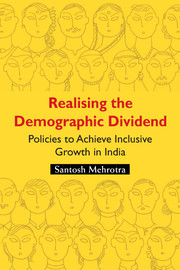Book contents
- Frontmatter
- Contents
- List of Tables and Figures
- Preface
- Acknowledgements
- Part 1 Growth, Employment and Inclusion
- Part 2 Human Capital Formation
- Chapter 8 Addressing Capability Deprivation of Women for Inclusive Growth
- Chapter 9 From the Right to Education to the Right to Learning
- Chapter 10 Food Security, Nutrition and Health: Policy Dilemmas and Interlinked Challenges
- Chapter 11 Redesigning Sanitation Programmes to Make India Free from Open Defaecation
- Part 3 Building a System of Social Protection
- Part 4 Governance
- Index
Chapter 9 - From the Right to Education to the Right to Learning
from Part 2 - Human Capital Formation
Published online by Cambridge University Press: 05 June 2016
- Frontmatter
- Contents
- List of Tables and Figures
- Preface
- Acknowledgements
- Part 1 Growth, Employment and Inclusion
- Part 2 Human Capital Formation
- Chapter 8 Addressing Capability Deprivation of Women for Inclusive Growth
- Chapter 9 From the Right to Education to the Right to Learning
- Chapter 10 Food Security, Nutrition and Health: Policy Dilemmas and Interlinked Challenges
- Chapter 11 Redesigning Sanitation Programmes to Make India Free from Open Defaecation
- Part 3 Building a System of Social Protection
- Part 4 Governance
- Index
Summary
India's population of illiterates in the year 2001 was greater than the total population of the country at the time of independence (1947). The illiterate population of around 343 million (in 2001) was the outcome of policies and funding patterns that prevailed in India from the Second Five Year Plan onwards (1957–62). While the First Five Year Plan had taken serious note of the requirements of elementary education, very soon thereafter higher and technical education began to take precedence over elementary education in policymakers’ priorities. The nation is still paying the price for this monumental lack of vision, and the poor in particular have remained excluded from the fruits of even elementary education. In an already highly socially stratified society, the exclusion from elementary education of girls, SCs, STs and Muslims has been the underlying cause of chronic poverty. As seen in chapter 1, the feedback loops from education impact every other human functioning and hence human capabilities generally. It is not surprising that in 2004–05 the number of poor (as estimated by the Planning Commission) was not dissimilar from the number of illiterates in India – 300 million. This is the context that gives urgency to the Right to Education (RTE). India is already half a century too late and behind the constitutional directive to universalise schooling for 6–14 year olds within 10 years from independence.
In December 2002 the Indian Parliament passed the Constitution 86th Amendment Act, which mandated the provision of free and compulsory education, by inserting Article 21A in the Fundamental Rights guaranteed by the Constitution: ‘the State shall provide free and compulsory education to all children of the age of 6–14 years in such a manner as the State may, by law, determine’. Article 21A in the Fundamental Rights chapter replaced Article 45 in the Directive Principles of State Policy: ‘the State shall endeavour to provide early childhood care and education for all children until they complete the age of 14 years’. But the 86th Constitutional Amendment stipulates that ‘It shall come into force from such date as the central government may by notification in the Official Gazette, appoint’. Unfortunately, this notification was never issued. Therefore, the 86th Constitutional Amendment did not come into force. It is for this reason that the need arose for the RTE Act (2009).
- Type
- Chapter
- Information
- Realising the Demographic DividendPolicies to Achieve Inclusive Growth in India, pp. 263 - 282Publisher: Cambridge University PressPrint publication year: 2015



